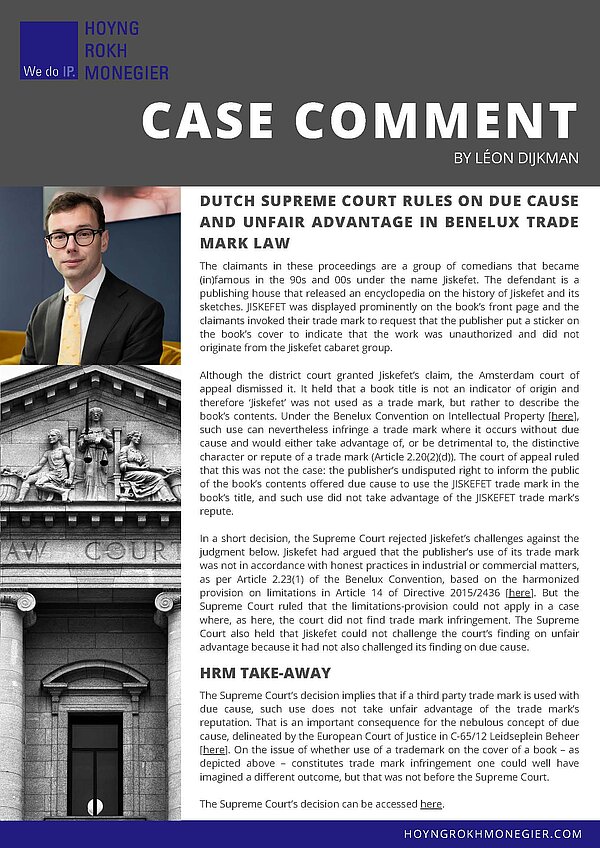The claimants in these proceedings are a group of comedians that became (in)famous in the 90s and 00s under the name Jiskefet. The defendant is a publishing house that released an encyclopedia on the history of Jiskefet and its sketches. JISKEFET was displayed prominently on the book’s front page and the claimants invoked their trade mark to request that the publisher put a sticker on the book’s cover to indicate that the work was unauthorized and did not originate from the Jiskefet cabaret group.
Although the district court granted Jiskefet’s claim, the Amsterdam court of appeal dismissed it. It held that a book title is not an indicator of origin and therefore ‘Jiskefet’ was not used as a trade mark, but rather to describe the book’s contents. Under the Benelux Convention on Intellectual Property [here], such use can nevertheless infringe a trade mark where it occurs without due cause and would either take advantage of, or be detrimental to, the distinctive character or repute of a trade mark (Article 2.20(2)(d)). The court of appeal ruled that this was not the case: the publisher’s undisputed right to inform the public of the book’s contents offered due cause to use the JISKEFET trade mark in the book’s title, and such use did not take advantage of the JISKEFET trade mark’s repute.
In a short decision, the Supreme Court rejected Jiskefet’s challenges against the judgment below. Jiskefet had argued that the publisher’s use of its trade mark was not in accordance with honest practices in industrial or commercial matters, as per Article 2.23(1) of the Benelux Convention, based on the harmonized provision on limitations in Article 14 of Directive 2015/2436 [here]. But the Supreme Court ruled that the limitations-provision could not apply in a case where, as here, the court did not find trade mark infringement. The Supreme Court also held that Jiskefet could not challenge the court’s finding on unfair advantage because it had not also challenged its finding on due cause.
HRM TAKE-AWAY
The Supreme Court’s decision implies that if a third party trade mark is used with due cause, such use does not take unfair advantage of the trade mark’s reputation. That is an important consequence for the nebulous concept of due cause, delineated by the European Court of Justice in C-65/12 Leidseplein Beheer [here]. On the issue of whether use of a trademark on the cover of a book – as depicted above – constitutes trade mark infringement one could well have imagined a different outcome, but that was not before the Supreme Court. The Supreme Court’s decision can be accessed here.


